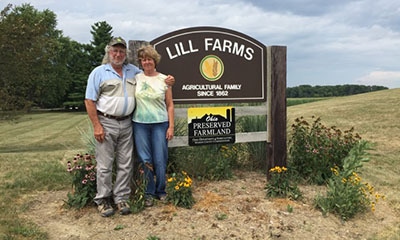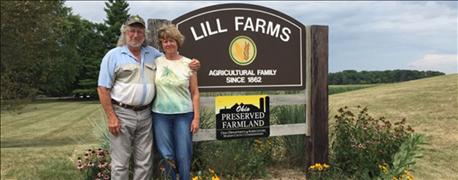September 22, 2016

Bob Lill’s mother, Florence, offered to pay for his college education to become a doctor or lawyer. Instead, Bob followed three generations of farmers before him and, in doing so, is determined to leave the land even better than when he started farming.
He’s implemented numerous conservation practices to ensure the sustainability of the land while protecting water and the habitats that encourage and feed wildlife.
He was an early adapter of no-till farming on his Marion farm, a practice that was started in 1981 and fully implemented by 1986.

Conservation is core of generational farming
Recognizing that water drainage was a problem not only on the Lill Farm, but also surrounding farms, Bob convinced six neighboring farmers of the benefits of creating a continuous waterway that would enable water to flow in its natural path, stop soil erosion, and improve water quality and crop production.
Bob and wife Betty Jo are a 2016 Ohio Conservation Farm Family Awards winner and will be honored Sept. 22 at the Farm Science Review. The Lills own 678 acres and lease another 708 acres, using best management practices on all.
Regular conservation practices on the farm include soil testing, water control projects such as waterways to prevent erosion and runoff, tiling for water drainage and crop rotation. And he’s now experimenting with cover crops.
The Lill family is particularly proud that in 2011, the home farm of 272 acres was permanently preserved through the Ohio Farmland Preservation Agriculture Easement Purchase Program. Bob says preserving the family heritage and the land as farmland is paramount, and he hopes to preserve all 678 acres.
This year, an additional 105 acres was accepted to be preserved and is being processed. “I’ve owned land since 1963 and never sold a lot in 53 years since; that’s something I’m proud of,” Bob says.
For wildlife, beneficial insects and beautification, land has been taken out of production and put into two farm ponds, a wetland and natural prairie. “These areas provide nesting and protective wildlife cover,” Bob says. “We have 45 acres of woodland that will not be timbered. We’ve sought advice from a state forester on how best to maintain and preserve a healthy woodland to save and preserve for wildlife and future generations.”
While his mother may have had visions of him in a suit behind a desk, it was pretty clear early on that it would be difficult to take farming out of the farm boy. “I grew up on the farm and spent my days by my father’s [Harold] side since about the age of 4,” Bob says. “I participated in FFA during high school and had my first FFA project in 1952 raising sheep and steers.”
It was Bob’s great-grandfather John Joseph Lill who started the family legacy. He came to the U.S. from Germany and began farming on a 40-acre parcel in 1862. That land went to his son, Jacob, then to his son, Harold, and now to Bob.
Bob and his first wife, Sharon, bought their first farm in 1963. Over more than 30 years, they survived the farm crash of the 1980s, endured weather events and even thrived at times, which allowed them to buy more land. Sharon worked alongside Bob on the farm until her death in 1991. In addition to cropland, they also had a large hog operation until the mid-1980s.
Bob and Betty Jo, who both have roots in Marion, have known each other for many years. After Sharon’s passing, they discovered they enjoyed many of the same things, including the outdoors, animals, travel and an appreciation for conservation and preservation. Now married for 25 years, Bob and Betty Jo have continued the Lill Farm legacy.
Her role on the farm is mainly support. “I assist with payroll and other computer work, but also help with transportation to and from fields during planting and harvest,” says Betty Jo. “I also provide animal care to our three horses and beef cattle we raise for family meat.”
Lills are ag-vocates
Betty Jo says the most enjoyable task she does is a quarterly farm newsletter for landlords, as well as administering the farm’s Facebook page called FarmView. It’s focused on telling the story of the farm through photos and stories of the day-to-day farm operation. Betty Jo says it’s important to raise awareness and appreciation for agriculture.
To further that outreach, the Lills had a historic cabin moved to their property and have used it for family and community gatherings where they show and talk about the importance of preservation. “It also gives us the opportunity to tell a positive story of agriculture,” Betty Jo says.
The cabin, built in 1820 and situated about a mile from the Lill farm, was slated for destruction. The project of dismantling and reassembling began in 2004 and was done two years later.
The Lills invest in conservation, but also people by hiring youths from the local vocational school. One of their first young employees, Dave Niederhuber, started his internship on the farm in 1989 from Tri Rivers Career Center and has worked on and off the farm since. He is now a full-time employee.
“We feel very fortunate to have his mechanical expertise and farming knowledge,” Bob says. Several more young people have followed. “They all have learned the value of hard work, importance of a good work ethic, and an appreciation of the land and the environment by working on the farm.”
The Lills have purchased more land over the years to expand the operation. It’s allowed for Bob’s son, Rob, to enter as a fifth-generation farmer. He and his wife, Vickie, are owners of Riverside Ice Cream and Country Caterers, but Bob says, “He’s a valuable supporter of the farm, helping mainly during planting and harvest.”
Rob’s son, Scott, helps on the farm part time, and represents the sixth generation. His son, Silas, 5, could be the seventh generation someday.
Bob’s daughter, Sonna Patingale, has her hands in the business, as well, doing the monthly farm book.
Betty Jo says she and Bob have been fortunate to carry on with the farm operation because of those before them. They’re working hard to make sure these future generations will have the same
reflection.
You May Also Like




